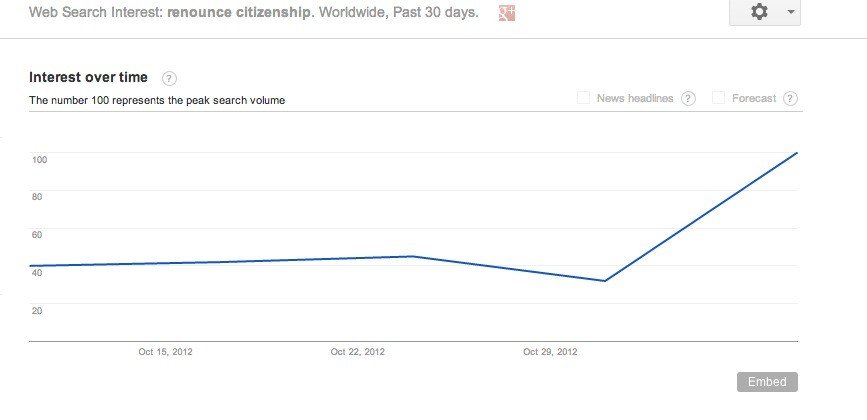November 9, 2012,
Santiago, Chile.
According to Google’s trend analysis, keyword searches for terms like “renounce citizenship” have soared in the past week.
Is it any wonder? Millions of people are disconcerted, dismayed, or outright disgusted at President Obama’s victory, and they sense a continued decline of civil liberties and economic opportunities.
The frustration and apprehension is understandable. I can’t begin to tell you how many emails we’ve received over the last few days, mostly from US citizens who reached their breaking points, asking “where can I get a second passport?”
A second passport feels like a way out– a solid insurance policy. And that’s true to a degree. But let’s talk about what a second passport is… versus what it isn’t.
Most importantly, a second passport is like an insurance policy. Rather than protecting you from risks of fires, floods, and fender benders, though, a second passport helps protect against sovereign risks.
Throughout history as once powerful empires have slid into terminal economic decline, political leaders have routinely resorted to plundering their citizens. Capital controls, exchange controls, price controls, and even direct confiscation of savings.
From Argentina to Greece, these same tools are being applied throughout the world today. A second passport gives you the means to defend yourself against these measures.
Predominantly, a second passport ensures that you ALWAYS have a place to go in case you need to leave your home country. Plus, it opens up new financial opportunities, making it much easier to establish foreign bank accounts to move your savings away from your home government’s thieving hands.
Again, it’s a great insurance policy. But a second passport should not be viewed out of context as a panacea. There are drawbacks.
With a second passport, you may be subjecting yourself to new taxes or reporting obligations to another country. Or potentially even military service. Not to mention, it can cost a LOT of money.
If you’re lucky enough to be descended from Italian, Irish, Polish, etc. ancestors, you may have a right to claim citizenship (and a high quality passport) at minimal cost and obligation.
Or if you have the ability to relocate, you can establish cost-effective residency in a place like Belgium and be eligible to apply for naturalization in just 3 years.
But spending tens of thousands of dollars… or even hundreds of thousands of dollars, especially if this constitutes a huge portion of your savings, is unwise. There may be better, cheaper ways you can protect yourself.
For example, those funds may be better allocated towards purchasing and storing precious metals overseas. Or buying productive land in a thriving foreign market. Or establishing a foreign trust to open new accounts through that entity.
Further, if you’re interested in having a place where you and your family can potentially relocate if the situation deteriorates in your home country, you could also take steps to obtain RESIDENCY (as opposed to citizenship) in a foreign country.
Here in Chile, for example, there are a number of ways to establish residency and acquire the right to live in the country at minimal cost. This also extends to your family as well.
All of these may be much better options for your savings and situation than dropping a hunk of cash on a passport.
No doubt, emotions are high right now for many people, and there’s no shortage of snake oil salesmen ready to pounce on that fear and ‘sell’ you a passport… which will likely just become a high-priced souvenir.
I’d encourage you first to step back and take a rational look at the options, and be mindful that there are likely better, more cost-effective solutions for you.








